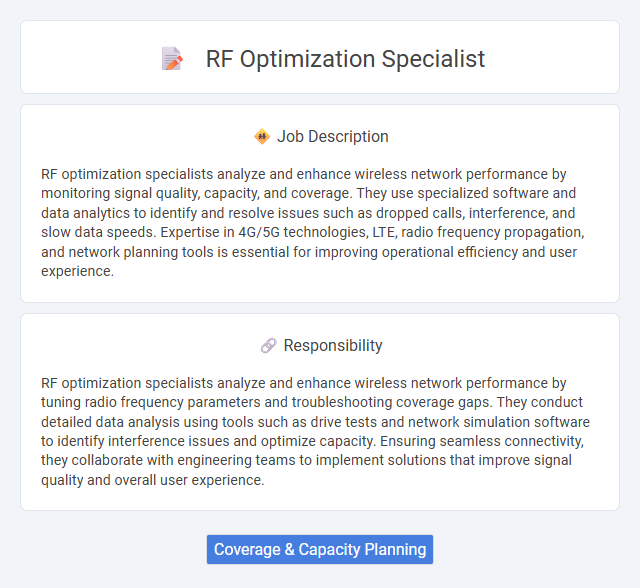
RF optimization specialists analyze and enhance wireless network performance by monitoring signal quality, capacity, and coverage. They use specialized software and data analytics to identify and resolve issues such as dropped calls, interference, and slow data speeds. Expertise in 4G/5G technologies, LTE, radio frequency propagation, and network planning tools is essential for improving operational efficiency and user experience.
Individuals who excel in analytical thinking and have a strong interest in mobile network technologies are likely to be well-suited for an RF optimization specialist role. Those comfortable with solving complex problems under pressure and possessing strong communication skills may find this job aligns with their abilities. However, candidates who prefer highly predictable routines or lack technical curiosity might struggle to thrive in this dynamic, detail-oriented position.
Qualification
An RF Optimization Specialist must possess a strong background in telecommunications engineering, with expertise in radio frequency technologies and network performance analysis. Proficiency in tools such as TEMS, Atoll, and Actix, combined with skills in LTE, 5G, and microwave optimization, is essential. A bachelor's degree in Electrical Engineering or a related field, coupled with practical experience in drive tests and data interpretation, significantly enhances qualification for this role.
Responsibility
RF optimization specialists analyze and enhance wireless network performance by tuning radio frequency parameters and troubleshooting coverage gaps. They conduct detailed data analysis using tools such as drive tests and network simulation software to identify interference issues and optimize capacity. Ensuring seamless connectivity, they collaborate with engineering teams to implement solutions that improve signal quality and overall user experience.
Benefit
RF optimization specialists likely enhance network performance by analyzing signal quality and adjusting configurations, which can result in improved data speeds and reduced dropped calls. Their expertise probably leads to increased customer satisfaction and loyalty, critical factors for telecom operators' success. Effective optimization may also lower operational costs by minimizing the need for physical maintenance and reducing energy consumption.
Challenge
An RF optimization specialist likely faces the challenge of continuously improving network performance in environments with rapidly evolving technologies and increasing user demands. They probably need to analyze large volumes of data to identify issues such as signal interference or coverage gaps, requiring strong problem-solving skills and attention to detail. The role may also involve balancing cost-effectiveness with performance improvements, which can create complex decision-making scenarios.
Career Advancement
RF optimization specialists drive network performance improvements through data analysis and parameter tuning, essential for telecommunication companies to enhance coverage and capacity. Expertise in 4G, 5G technologies, and tools like drive testing software positions candidates for leadership roles in network strategy and project management. Continuous skill development in AI integration and network automation accelerates career progression toward senior technical consultant or network optimization manager roles.
Key Terms
Coverage & Capacity Planning
RF Optimization Specialists specialize in Coverage and Capacity Planning to enhance network performance and reliability. They analyze radio frequency data, optimize signal distribution, and adjust network parameters to reduce coverage gaps and prevent capacity congestion. Their expertise ensures efficient spectrum utilization and improved user experience in wireless communication systems.
 kuljobs.com
kuljobs.com